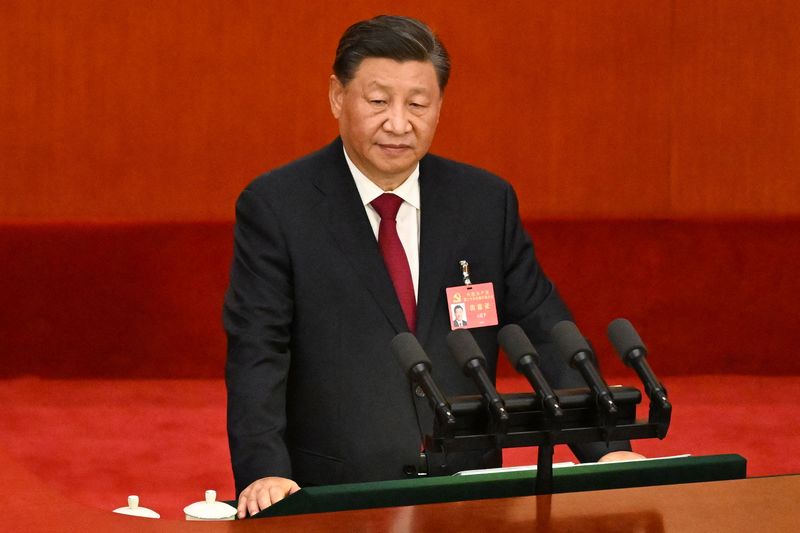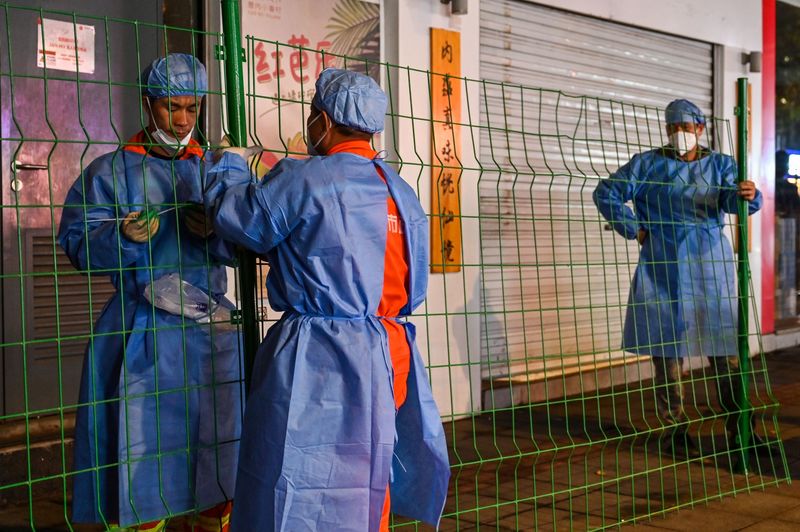Xi Must End Covid-Zero Shadow Over World Economy
China’s 20th party congress casts a global shadow. And yet what is set up to be a “new” regime in China seems beset with many things old. President Xi Jinping will almost certainly secure a third term this week, but despite this impressive accretion of power, he has trailed that he intends to double down on virtually all his policy stances. The one that matters to investors, to the exclusion of almost all else, is Covid Zero.
In opening the gathering Sunday with a nearly two-hour speech, Xi highlighted the party’s key economic policies and his plans for the next half-decade. His tone was defiant, indicating little trace of the economic challenges China has yet to surmount, including youth unemployment and the ongoing property crisis. And while problems with translation are inevitable at a time like this, analysts point out that his notably short speech was outward-looking with geopolitical tensions and technological competition with the US key in his agenda. Quants have been at work and discovered that the word for “security” appears far more often than in his speech for the same event in 2017, while “reform” appears much less.
Christopher Smart, chief global strategist at Barings, said: “Politically, rising tensions with China mean that what was once the world’s greatest economic opportunity is now among its greatest sources of risk.”

The critical issue, in investors’ eyes, is the official policy of Covid Zero — responding with lockdowns to any outbreaks in an attempt to stop the spread of the coronavirus. This worked very well until the advent of the omicron variant at the end of 2021; since then, to quote Matthews Asia’s China strategist Andy Rothman, Covid Zero “has been an economic and social disaster.”
When will it end? Evercore’s China strategist Neo Wang expects the country to start exiting from Covid Zero by late March 2023 and notes that Xi’s “Mao-like” affirmation for a third term, which leaves him in the strongest position for a Chinese leader since Mao Zedong, could “catalyze equities to price the reopening sooner.”
The moment cannot come too soon, as Evercore illustrates that Chinese equities (as measured by the Hang Seng index) are threatening to break below an upward trend that had persisted ever since the post-Tiananmen Square reforms initiated by Deng Xiaoping 30 years ago:

Pressure remains greatest from international investors, with US-listed American Depositary Receipts and Hong Kong-quoted stocks falling far further than mainland stock exchanges:
International Confidence Ebbs Away
Chinese stocks quoted in the US and Hong Kong have fared the worst

Realistically, the Chinese leadership will find it much easier to climb back from lockdowns if it can make much more progress with vaccinating the population. Wang, in a note published Sunday, said he was encouraged by the approval of China’s mRNA vaccine, AWcorna, in Indonesia under emergency use authorization, and held that the optimistic case was for a vaccine announcement by mid-November in the run-up to a domestic reopening in March.
Others were less optimistic for any one big “catalyst” moment. Rothman said: “I don’t expect Xi to make a speech saying Zero Covid is over. I just expect gradual changes from the government.” He added that it wouldn’t be difficult for Xi to step back: “Who in China is to say they prefer to be locked down? It’s not embarrassing for him to make this change.”
As for Michael Hirson, 22V Research’s China expert, Xi’s speech brought few surprises that could make for positive catalysts. There were no radical turns but also no indications that any policy will be more pragmatic or market-friendly.
Common prosperity made a comeback in Xi’s focus on quality-of-life issues but is unlikely to be a radical policy agenda. Wording on Taiwan was strong but not suggestive of rising risk of an invasion; Xi’s tone on geopolitics was subdued, likely as an effort to remain nimble and seek to repair China’s ties with Europe amid the Ukraine crisis and high US-China tensions.
Even if Xi didn’t stoke the issue further, geopolitical worries about Taiwan remain intense. US Secretary of State Anthony Blinken said Monday that China has made a decision to seize the self-governing island on a “much faster timeline” than originally thought. Xi said in his speech that while peaceful means were preferable to “reunification” with Taiwan, “we reserve the option of taking all measures necessary.”
Sentiment darkened when China delayed the publication of gross domestic product data originally scheduled for Monday without giving a reason, fueling investor uncertainty. Still, much optimism remains. Evercore expects the Chinese economy to grow 5.2% in 2023 compared to the forecast for America at 0% (of which more below). That’s because the end of Covid Zero could be galvanizing. Youth unemployment, a major pressure point for Xi’s “common prosperity” policy, should be alleviated by a reopening, Evercore’s Wang noted, while also unlocking around $660 billion in year-to-date extra savings that would support discretionary spending.
Author: John Authers, Bloomberg


